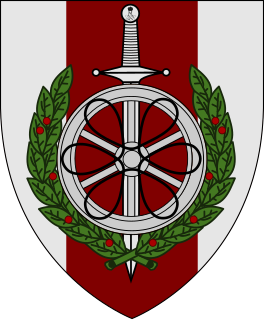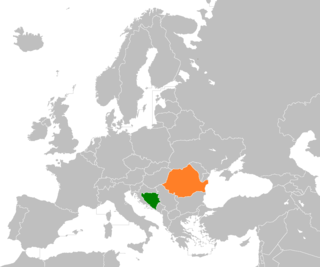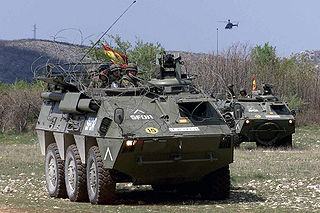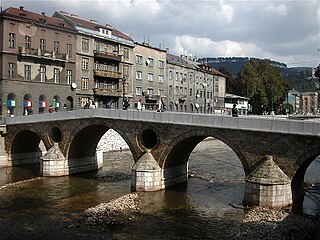Related Research Articles

The Armed Forces of Bosnia and Herzegovina is the official military force of Bosnia and Herzegovina. The BiH armed forces were officially unified in 2005 and are composed of two founding armies: the Bosniak-Croat Army of the Federation of Bosnia and Herzegovina and the Bosnian Serbs' Army of Republika Srpska (VRS).

The Implementation Force (IFOR) was a NATO-led multinational peace enforcement force in Bosnia and Herzegovina under a one-year mandate from 20 December 1995 to 20 December 1996 under the codename Operation Joint Endeavour.

The Stabilisation Force in Bosnia and Herzegovina (SFOR) was a NATO-led multinational peacekeeping force deployed to Bosnia and Herzegovina after the Bosnian war. Although SFOR was led by NATO, several non-NATO countries contributed troops. It was replaced by EUFOR Althea in December 2004.

Operation Althea, formally the European Union Force Bosnia and Herzegovina (EUFOR), is a military deployment in Bosnia and Herzegovina to oversee the military implementation of the Dayton Agreement. It is the successor to NATO's SFOR and IFOR. The transition from SFOR to EUFOR was largely a change of name and commanders: 80% of the troops remained in place. It replaced SFOR on 2 December 2004.
Dancon, an abbreviation of Danish Contingent, is the term that comprises all Danish national forces in a current military mission of the UN, NATO, or national character. Dancon is not a military unit per se, like a brigade, but rather an organisation in which all military units currently working in a mission are linked together. The commander of Dancon is usually the commander of the hierarchically biggest military unit associated with the specified mission, and does not have a headquarters of its own, but rather it is that military unit's headquarters.

Operation Deliberate Force was a sustained air campaign conducted by the North Atlantic Treaty Organisation (NATO), in concert with the United Nations Protection Force (UNPROFOR) ground operations, to undermine the military capability of the Army of Republika Srpska (VRS), which had threatened and attacked UN-designated "safe areas" in Bosnia and Herzegovina during the Bosnian War with the Srebrenica and Markale massacres, precipitating the intervention. The shelling of the Sarajevo market place on 28 August 1995 by the VRS is considered to be the immediate instigating factor behind NATO's decision to launch the operation.

Gregory L. Schulte was the U.S. ambassador to the International Atomic Energy Agency from July 2005 through June 2009. Schulte served as the Permanent Representative of the United States to the United Nations Office at Vienna, the International Atomic Energy Agency, and other international organizations in Vienna. Assuming his post on July 13, 2005, Schulte was charged with advancing the President's agenda in countering proliferation, terrorism, organized crime, and corruption, while promoting the peaceful use of nuclear energy.

Mechanized Infantry Brigade "Iron Wolf" is the core unit of the Lithuanian Army and forms the country's contribution to NATO collective defence. The name of the brigade relates to the Lithuanian mythical character from the medieval foundation legend of the Vilnius city.

Operation Grapple was the codeword used to cover UK defence operations in support of the UN peacekeeping missions in the former Yugoslavia ; including the deployment of British forces in Bosnia and Croatia from October 1992 until December 1995 as part of the United Nations Protection Force (UNPROFOR). UNPROFOR would eventually hand over the peacekeeping mission in Bosnia to NATO's Implementation Force (IFOR) in winter 1995. The British participation in the IFOR was called Operation Resolute; the whole NATO mission was called Operation Joint Endeavour. The IFOR mission would last approximately a year, before it transitioned to the follow-on Stabilisation Force in Bosnia and Herzegovina (SFOR).
Romania joined the North Atlantic Treaty Organisation (NATO) on March 29, 2004 following the decision taken at the Prague Summit, in November 2002. For Romania, this has represented a major evolution, with decisive influence on the foreign and domestic policy of the country. NATO membership represents the guarantee of security and external stability, which is vital for ensuring the prosperous development of the country. Romania is playing an active role in promoting the values and objectives of the Alliance, by both participating in the operations and missions of the Alliance and involving in its conceptual initiatives and evolutions.

National Support Elements (NSE) were part of the IFOR, and later the SFOR, NATO led forces, which were deployed primarily in former Yugoslavia from 1996 to 2004. Many of the NSE's were deployed in Hungary - even though this country was neither part of the conflict, nor a NATO member at the time - because of the local stability, good infrastructure, access to local supply ordering and relatively short distance to the battalions in Bosnia.

The Danish International Logistical Center (DANILOG) was established in 2001 as a regimental-level logistics unit that is part of the Danish Army Operational Command. It was based out of Vordingborg Kaserne.

Bosnia and Herzegovina–Romania relations are foreign relations between Romania and Bosnia and Herzegovina. Both countries are full members of the Southeast European Cooperation Process, of the Southeast European Cooperative Initiative, and of the Stability Pact for South Eastern Europe. Bosnia and Herzegovina has an embassy in Bucharest. Romania has an embassy in Sarajevo.

The NATO intervention in Bosnia and Herzegovina was a series of actions undertaken by NATO whose stated aim was to establish long-term peace during and after the Bosnian War. NATO's intervention began as largely political and symbolic, but gradually expanded to include large-scale air operations and the deployment of approximately 60,000 soldiers under Operation Joint Endeavor.

United Nations Security Council resolution 1088, adopted unanimously on 12 December 1996, after recalling all resolutions on the conflicts in the former Yugoslavia and in particular resolutions 1031 (1995) and 1035 (1995), the Council, acting under Chapter VII of the United Nations Charter, authorised the creation of the Stabilisation Force (SFOR) in Bosnia and Herzegovina to replace the Implementation Force (IFOR).

United Nations Security Council resolution 1174, adopted unanimously on 15 June 1998, after recalling resolutions 1031 (1995), 1035 (1995), 1088 (1996), 1103 (1997), 1107 (1997), 1144 (1997) and 1168 (1998), the Council extended the mandate of the United Nations Mission in Bosnia and Herzegovina (UNMIBH) for a period terminating on 21 June 1999 and authorised states participating in the NATO led Stabilisation Force (SFOR) to continue to do so for a further twelve months.

Headquarters Allied Force Command Heidelberg was a formation of North Atlantic Treaty Organization (NATO) responsible for providing deployable joint staff elements (DJSE) in support of NATO operations worldwide. It was headquartered at Campbell Barracks, Germany, and reported to the Joint Force Command Brunssum (JFCBS). During the War on Terrorism, it provided command and control elements to the International Security Assistance Force (ISAF). It was disbanded on 1 April 2013.
United Nations Security Council Resolution 2019 was unanimously adopted on 16 November 2011, and approved the mandate of European force in Bosnia and Herzegovina.
The Multi-National Division (South-West) was a military formation which formed part of IFOR, a NATO-led multinational peacekeeping force in Bosnia and Herzegovina under a one-year mandate from 20 December 1995 to 20 December 1996, and then formed part of SFOR, another NATO-led multinational peacekeeping force, from 20 December 1996 until June 2004.

Multi-National Division (North) was an international military formation, part of IFOR and then SFOR under NATO command in Bosnia-Hercegovina from 1995. It was based at Tuzla and was American led. Its U.S. designation was Task Force Eagle.
References
- ↑ Jean Callaghan; Mathias Schönborn; George C. Marshall European Center for Security Studies (2004). Warriors in Peacekeeping: Points of Tension in Complex Cultural Encounters ; a Comparative Study Based on Experiences in Bosnia. LIT Verlag Münster. pp. 108–. ISBN 978-3-8258-5172-9.
- ↑ Sørensen, Henning. "Danish Senior Officers' Experiences from IFOR/SFOR, Bosnia". isfdanmark.dk. ISF, Institut for Sociologisk Forskning,. Retrieved 7 March 2020.CS1 maint: extra punctuation (link)
http://www.nato.int/sfor/misc/nordpol/t991017i.htm
| This article about an international organization is a stub. You can help Wikipedia by expanding it. |
| This military-related article is a stub. You can help Wikipedia by expanding it. |